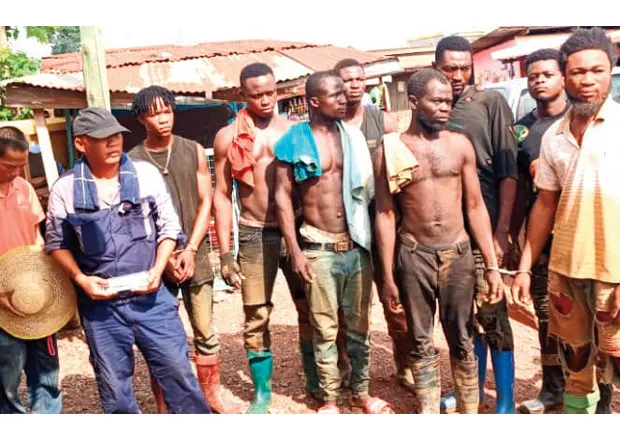Paragraph 1: The "Halt" Operation and its Impact
The Forestry Commission of Ghana, in collaboration with the military, launched a decisive operation codenamed "Halt" to combat illegal mining, commonly known as "galamsey," within the Western North Region’s forest reserves. This swift intervention, spanning less than three weeks, yielded significant results, including the seizure of 85 excavators, two bulldozers, and several generators used in illicit mining activities. Furthermore, 28 suspects were apprehended, comprising four Chinese nationals and 24 Ghanaians. The operation targeted various forest reserves, including Tano Anwia, Sui, Anhwianso South, and Boin River, demonstrating a comprehensive approach to tackling the pervasive galamsey problem.
Paragraph 2: Arrests and the Role of Local Authorities
The arrests made during Operation Halt highlight both the organized nature of illegal mining and the collaborative efforts employed in combating it. On March 9, 2025, twelve illegal miners, including three Chinese nationals, were apprehended within the Tano Anwia Forest Reserve. Subsequent arrests occurred in the Sui Forest Reserve between March 12 and 14, netting six more suspects. In Anhwianso South Forest Reserve, four individuals, including one Chinese national, were arrested on March 23, 2025. Finally, six more suspects were arrested in the Boin River Forest Reserve. These arrests reflect the involvement of both the military, who assisted with ten arrests, and the Enchi District staff and Rapid Response Team of the Forestry Commission, who apprehended the remaining eighteen suspects.
Paragraph 3: Community Response and Concerns
The operation received widespread support from local communities, who expressed relief at the Forestry Commission’s intervention to safeguard their precious forest reserves. Residents lamented the detrimental effects of galamsey, including water pollution that hampered agricultural activities and the destruction of their farmlands. The lack of rainfall in the area was also attributed to the deforestation caused by illegal mining, highlighting the far-reaching environmental consequences of this illicit practice. Despite applauding the Forestry Commission’s efforts, residents expressed frustration over the perceived inaction of the Western North Regional Minister in addressing the galamsey issue. They questioned the ownership of the numerous excavators still operating in the region and sought clarification on the government’s plans for the confiscated equipment.
Paragraph 4: The Broader Context of Illegal Mining
Galamsey, the illegal small-scale mining of gold and other minerals, has become a significant environmental and social challenge in Ghana. It poses a severe threat to the country’s forests, water bodies, and biodiversity. The use of heavy machinery, such as excavators and bulldozers, in galamsey operations leads to widespread deforestation, soil erosion, and habitat destruction. Furthermore, the discharge of mercury and other toxic chemicals into rivers and streams contaminates water sources, impacting human health and aquatic life. The involvement of foreign nationals in galamsey adds another layer of complexity to the issue, often raising concerns about organized crime and the exploitation of local resources.
Paragraph 5: Combating Illegal Logging – A Parallel Challenge
In addition to combating illegal mining, the Forestry Commission, with military support, also addressed the issue of illegal logging in the Western North Region. Six suspects involved in illegal logging activities were apprehended, and ten trucks laden with illegally harvested logs were impounded. The locations of these operations spanned across several areas, including Sefwi Asawinso, Sefwi Wiawso, Sefwi Boako, and the Sefwi Agyemandiem Krokuasue Forest Reserve. This concurrent crackdown underscores the Forestry Commission’s commitment to protecting the region’s forests from multiple threats.
Paragraph 6: The Way Forward – Sustainable Solutions
The success of Operation Halt demonstrates the effectiveness of collaborative efforts between government agencies and the military in tackling illegal activities within forest reserves. However, long-term solutions require a multifaceted approach that addresses the root causes of galamsey and illegal logging. This includes strengthening law enforcement, promoting sustainable alternative livelihoods for communities dependent on these activities, and raising public awareness about the environmental and social consequences of these practices. Furthermore, transparent and accountable governance is essential to ensure that confiscated equipment is properly disposed of and that any proceeds benefit affected communities. By working together, government, communities, and civil society organizations can protect Ghana’s valuable forest resources for future generations.


